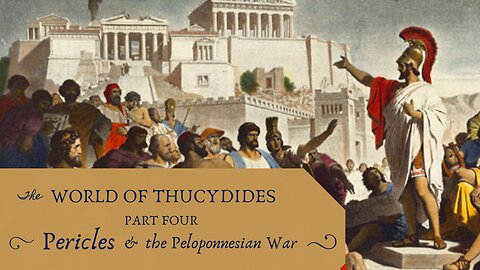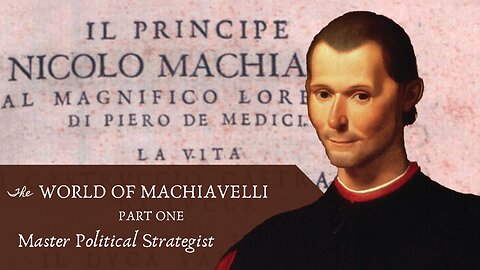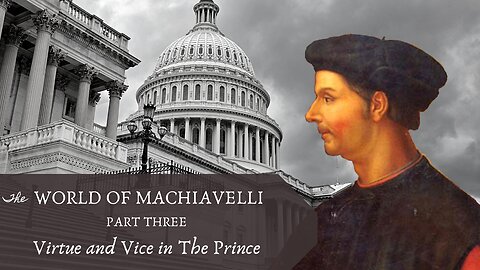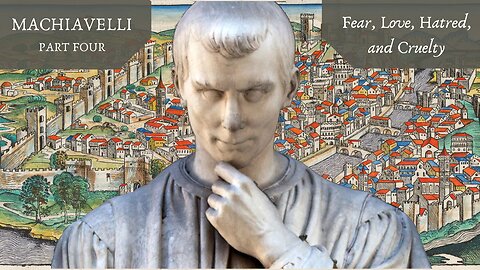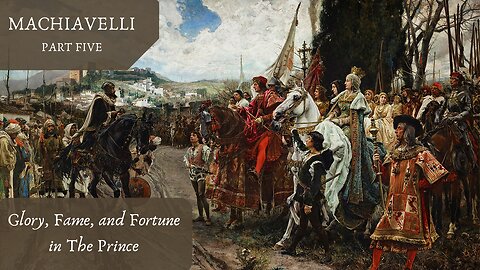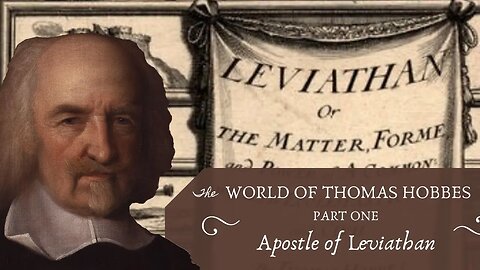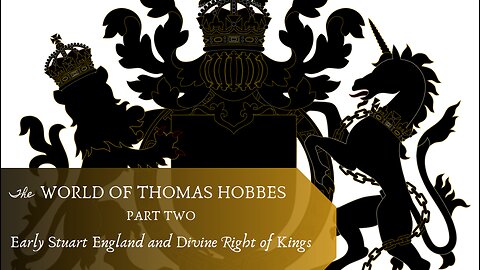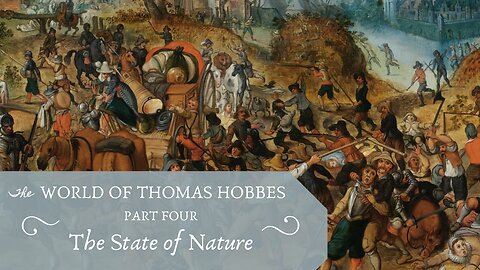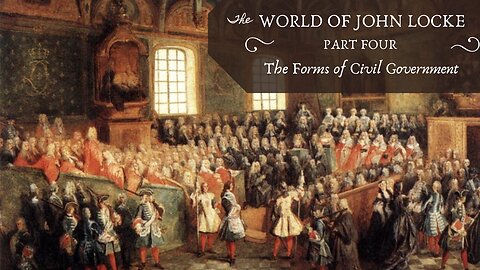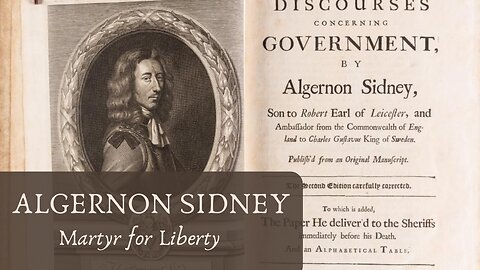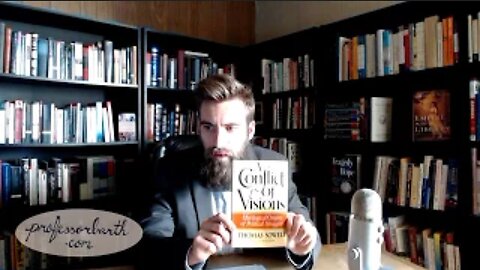Premium Only Content
This video is only available to Rumble Premium subscribers. Subscribe to
enjoy exclusive content and ad-free viewing.
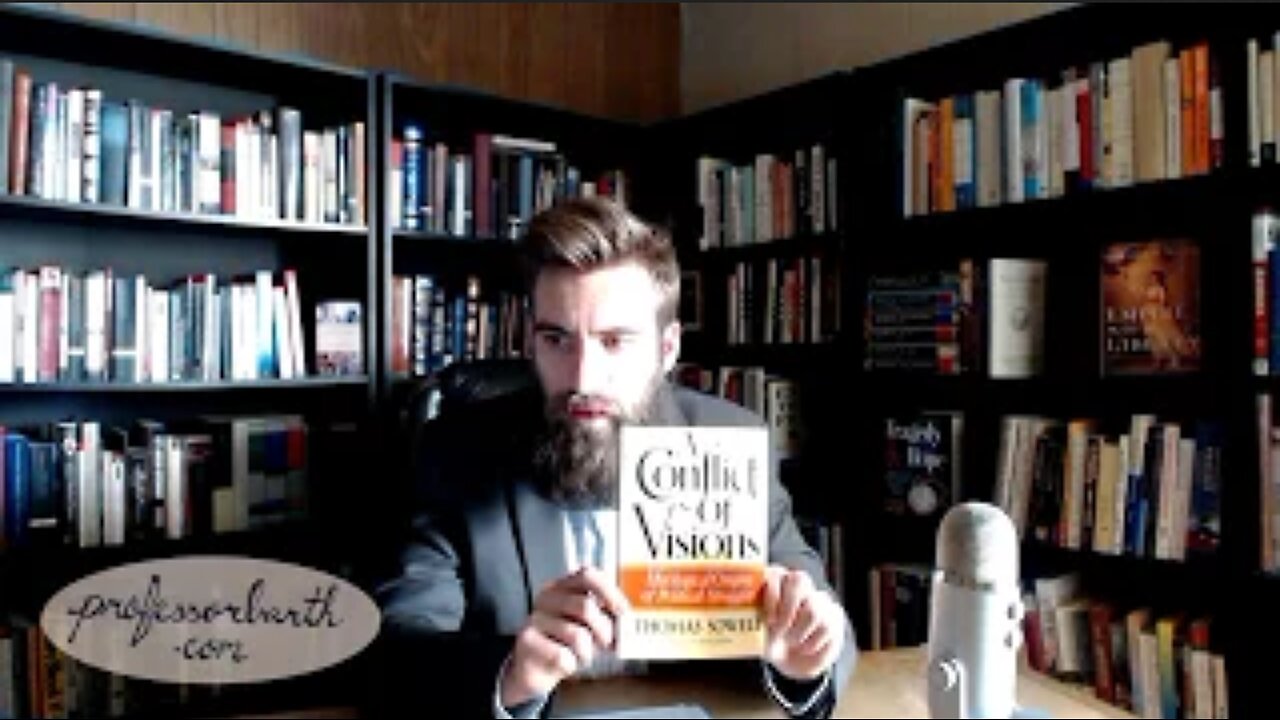
1
Thucydides: The Great Historian of Ancient Greece (Thucydides, Pt. 1)
Professor Barth
New lecture series on Thucydides, author of The History of the Peloponnesian War. In part one, we will explore why many academics view Thucydides as the first scientific historian, owing, chiefly, to his empirical, historical method of evaluating and scrutinizing primary sources and mining for data and evidence. In this video, we contrast Thucydides with another great historian, Herodotus. Herodotus wrote on the Greco-Persian Wars; Thucydides wrote on the epic conflict between Athens (the Delian League) and Sparta and her allies (the Peloponnesian League).
Timecodes:
0:00 - Intro
3:42 - Historical Method
16:13 - Herodotus
_______________________________________
If enjoy this channel and would like to support:
https://patreon.com/professorbarth
Follow me on Twitter:
https://twitter.com/Professor_Barth
Buy my book! The Currency of Empire: Money and Power in English America, released June 2021 with Cornell University Press. Order your copy now.
https://www.amazon.com/Currency-Empire-Seventeenth-Century-English-America/dp/1501755773/ref=tmm_pap_swatch_0?_encoding=UTF8&qid=1611158577&sr=8-1
_______________________________________
Dr. Jonathan Barth received his PhD in history from George Mason University in 2014. He specializes in the history of money and banking in the early modern period, with corollary interests in early modern politics, empire, culture, and ideas. Barth is Associate Professor of History at Arizona State University and Associate Director of the Center for American Institutions at Arizona State University.
_______________________________________
Visit my website https://www.professorbarth.com/
_______________________________________
Disclaimer: The views and opinions expressed on this channel are my own and do not reflect the views of Arizona State University, nor are any of the views endorsed by Arizona State University.
3
comments
2
War is a Violent Teacher - Human Nature Laid Bare (Thucydides, Pt. 2)
Professor Barth
A continuation of our new lecture series on Thucydides, author of The History of the Peloponnesian War, between Athens (the Delian League) and Sparta and her allies (the Peloponnesian League). In part one, we examined Thucydides' historical method. For part two we examine Thucydides' view of human nature, and in particular his account of the civil war in Corcyra and his view of democracy.
Timecodes:
0:00 - Intro
1:03 - Man is innately good?
3:38 - Man is innately vicious
7:32 - Thucydides and human nature
8:46 - Civil war in Corcyra
20:31 - Paul's epistle to the Romans
22:31 - Political realism / realpolitik
24:50 - Problems with democracy
_______________________________________
If enjoy this channel and would like to support:
https://patreon.com/professorbarth
Follow me on Twitter:
https://twitter.com/Professor_Barth
Buy my book! The Currency of Empire: Money and Power in English America, released June 2021 with Cornell University Press. Order your copy now.
https://www.amazon.com/Currency-Empire-Seventeenth-Century-English-America/dp/1501755773/ref=tmm_pap_swatch_0?_encoding=UTF8&qid=1611158577&sr=8-1
_______________________________________
Dr. Jonathan Barth received his PhD in history from George Mason University in 2014. He specializes in the history of money and banking in the early modern period, with corollary interests in early modern politics, empire, culture, and ideas. Barth is Associate Professor of History at Arizona State University and Associate Director of the Center for American Institutions at Arizona State University.
_______________________________________
Visit my website https://www.professorbarth.com/
_______________________________________
Disclaimer: The views and opinions expressed on this channel are my own and do not reflect the views of Arizona State University, nor are any of the views endorsed by Arizona State University.
1
comment
3
Athens vs. Sparta (Thucydides, Pt. 3)
Professor Barth
A continuation of our lecture series on Thucydides, author of The History of the Peloponnesian War, this one on Athens (the Delian League) versus Sparta (the Peloponnesian League) - two radically different visions of political economy. We examine Athenian democracy, headed by Pericles, its navy (the trireme) and the Golden Age of Athens in general exemplified in the glorious structures of the Acropolis, namely the Parthenon, and Greek art, literature, culture, learning, and philosophy - the era of Socrates. We then examine Sparta, also known as Lacedaemon. The Spartans / Lacedaemonians created a land-based oligarchy focused almost exclusively on military might and strength, founded, according to legend, on a constitution of laws formulated by Lycurgus. Sparta dominated the Peloponnese, and allied with Corinth and Thebes for the purposes of taking down Athenian naval power.
Timecodes:
0:00 - Intro
2:08 - Golden Age of Athens
6:56 - Athenian Democracy
15:03 - Sparta
_______________________________________
If enjoy this channel and would like to support:
https://patreon.com/professorbarth
Follow me on Twitter:
https://twitter.com/Professor_Barth
Buy my book! The Currency of Empire: Money and Power in English America, released June 2021 with Cornell University Press. Order your copy now.
https://www.amazon.com/Currency-Empire-Seventeenth-Century-English-America/dp/1501755773/ref=tmm_pap_swatch_0?_encoding=UTF8&qid=1611158577&sr=8-1
_______________________________________
Dr. Jonathan Barth received his PhD in history from George Mason University in 2014. He specializes in the history of money and banking in the early modern period, with corollary interests in early modern politics, empire, culture, and ideas. Barth is Associate Professor of History at Arizona State University and Associate Director of the Center for American Institutions at Arizona State University.
_______________________________________
Visit my website https://www.professorbarth.com/
_______________________________________
Disclaimer: The views and opinions expressed on this channel are my own and do not reflect the views of Arizona State University, nor are any of the views endorsed by Arizona State University.
1
comment
4
Pericles and the Peloponnesian War (Thucydides, Pt. 4)
Professor Barth
A continuation of our lecture series on Thucydides, author of The History of the Peloponnesian War. In this video we read excerpts from two of Pericles' most famous speeches, as recorded by Thucydides: the Funeral Oration and his Last Speech, which took place in context of a great plague that struck Athens. The Peloponnesian War was fought between Athens (the Delian League) and Sparta (the Peloponnesian League, which included Corinth). Certain timeless themes crop up in these speeches: liberty, democracy, the rule of law, patriotism, and masculine virtues of courage, discipline, duty, honor, strength, action, decisiveness, wisdom and knowledge. Enjoy these speeches from the greatest Athenian general and statesmen.
Timecodes:
0:00 Intro
2:53 Thucydides Trap
13:25 Pericles' Funeral Oration
23:06 Plague of Athens (430 BC)
32:43 Political realism/ Realpolitik
41:30 Thucydides' Judgment of Pericles
_______________________________________
If enjoy this channel and would like to support:
https://patreon.com/professorbarth
Follow me on Twitter:
https://twitter.com/Professor_Barth
Buy my book! The Currency of Empire: Money and Power in English America, released June 2021 with Cornell University Press. Order your copy now.
https://www.amazon.com/Currency-Empire-Seventeenth-Century-English-America/dp/1501755773/ref=tmm_pap_swatch_0?_encoding=UTF8&qid=1611158577&sr=8-1
_______________________________________
Dr. Jonathan Barth received his PhD in history from George Mason University in 2014. He specializes in the history of money and banking in the early modern period, with corollary interests in early modern politics, empire, culture, and ideas. Barth is Associate Professor of History at Arizona State University and Associate Director of the Center for American Institutions at Arizona State University.
_______________________________________
Visit my website https://www.professorbarth.com/
_______________________________________
Disclaimer: The views and opinions expressed on this channel are my own and do not reflect the views of Arizona State University, nor are any of the views endorsed by Arizona State University.
1
comment
5
The Melian Dialogue (Thucydides, Pt. 5)
Professor Barth
The fifth and final installment of our lecture series on Thucydides, author of The History of the Peloponnesian War. In this video we examine the tension between realism and idealism by reading excerpts from a great dialogue between Athens and the leaders of the free island of Melos.
_______________________________________
If enjoy this channel and would like to support:
https://patreon.com/professorbarth
Follow me on Twitter:
https://twitter.com/Professor_Barth
Buy my book! The Currency of Empire: Money and Power in English America, released June 2021 with Cornell University Press. Order your copy now.
https://www.amazon.com/Currency-Empire-Seventeenth-Century-English-America/dp/1501755773/ref=tmm_pap_swatch_0?_encoding=UTF8&qid=1611158577&sr=8-1
_______________________________________
Dr. Jonathan Barth received his PhD in history from George Mason University in 2014. He specializes in the history of money and banking in the early modern period, with corollary interests in early modern politics, empire, culture, and ideas. Barth is Associate Professor of History at Arizona State University and Associate Director of the Center for American Institutions at Arizona State University.
_______________________________________
Visit my website https://www.professorbarth.com/
_______________________________________
Disclaimer: The views and opinions expressed on this channel are my own and do not reflect the views of Arizona State University, nor are any of the views endorsed by Arizona State University.
6
Machiavelli: Master Political Strategist (Machiavelli, Pt. 1)
Professor Barth
New section of the lecture series, Foundations of Western Political Thought -- this time on Niccolò Machiavelli, writer on statecraft during the Italian Renaissance. Machiavelli is so famous (or notorious) that an entire approach toward politics is named after him: Machiavellian. His most famous work is The Prince, as well as his Discourses on Livy. A citizen of Florence, Machiavelli embodied a new era of secular humanism in his approach toward politics.
Timecodes:
0:00 - Intro
6:44 - Machiavellian Politics and Statecraft
16:14 - Italian Renaissance
23:26 - Discourses on Livy
36:54 - The Prince
_______________________________________
If enjoy this channel and would like to support:
https://patreon.com/professorbarth
Follow me on Twitter:
https://twitter.com/Professor_Barth
Buy my book! The Currency of Empire: Money and Power in English America, released June 2021 with Cornell University Press. Order your copy now.
https://www.amazon.com/Currency-Empire-Seventeenth-Century-English-America/dp/1501755773/ref=tmm_pap_swatch_0?_encoding=UTF8&qid=1611158577&sr=8-1
_______________________________________
Dr. Jonathan Barth received his PhD in history from George Mason University in 2014. He specializes in the history of money and banking in the early modern period, with corollary interests in early modern politics, empire, culture, and ideas. Barth is Associate Professor of History at Arizona State University and Associate Director of the Center for American Institutions at Arizona State University.
_______________________________________
Visit my website https://www.professorbarth.com/
_______________________________________
Disclaimer: The views and opinions expressed on this channel are my own and do not reflect the views of Arizona State University, nor are any of the views endorsed by Arizona State University.
1
comment
7
Machiavellian Politics in Florence and Renaissance Italy (Machiavelli, Pt. 2)
Professor Barth
Part Two of our series on Niccolò Machiavelli, itself part of a larger series, Foundations of Western Political Thought. In this video we explore the political world in which Machiavel operated. In Florentine politics, we see the domination of the Medici dynasty - Cosimo de' Medici and Lorenzo de' Medici - followed by the lackluster Piero the Unfortunate, a French invasion from King Charles VIII, the short-lived ruler of friar Girolamo Savonarola, the re-establisment of the Florentine republic - during which Machiavelli served as a diplomat - and then the restoration of Medici rule in 1512. A lively array of characters appear in this video, including King Louis XII, Rodrigo de Borja, turned Pope Alexander VI, Cesare Borgia, Ramiro d'Orco, and Giuliano della Rovere, who became Pope Julius II, the Warrior Pope. Machiavelli lived out the rest of his years in exile, during which time he published The Prince, The Art of War, and Discourses on Livy.
Timecodes:
0:00 - Intro
2:18 - House of Medici
5:26 - Italian Wars
11:38 - Savonarola
15:40 - Diplomatic career of Machiavelli
18:40 - Cesare Borgia
32:18 - Pope Julius II
38:44 - Restoration of the Medici
41:16 - Machiavelli in exile
_______________________________________
If enjoy this channel and would like to support:
https://patreon.com/professorbarth
Follow me on Twitter:
https://twitter.com/Professor_Barth
Buy my book! The Currency of Empire: Money and Power in English America, released June 2021 with Cornell University Press. Order your copy now.
https://www.amazon.com/Currency-Empire-Seventeenth-Century-English-America/dp/1501755773/ref=tmm_pap_swatch_0?_encoding=UTF8&qid=1611158577&sr=8-1
_______________________________________
Dr. Jonathan Barth received his PhD in history from George Mason University in 2014. He specializes in the history of money and banking in the early modern period, with corollary interests in early modern politics, empire, culture, and ideas. Barth is Associate Professor of History at Arizona State University and Associate Director of the Center for American Institutions at Arizona State University.
_______________________________________
Visit my website https://www.professorbarth.com/
_______________________________________
Disclaimer: The views and opinions expressed on this channel are my own and do not reflect the views of Arizona State University, nor are any of the views endorsed by Arizona State University.
1
comment
8
Virtue and Vice in The Prince (Machiavelli, Pt. 3)
Professor Barth
Part Three of our series on Niccolò Machiavelli, part of a larger series, Foundations of Western Political Thought. In this video we explore the Machiavellian analysis of virtue and vice Machiavel operated in Renaissance Italy, in Florence, a city dominated for much of his lifetime by the Medici dynasty.
_______________________________________
If enjoy this channel and would like to support:
https://patreon.com/professorbarth
Follow me on Twitter:
https://twitter.com/Professor_Barth
Buy my book! The Currency of Empire: Money and Power in English America, released June 2021 with Cornell University Press. Order your copy now.
https://www.amazon.com/Currency-Empire-Seventeenth-Century-English-America/dp/1501755773/ref=tmm_pap_swatch_0?_encoding=UTF8&qid=1611158577&sr=8-1
_______________________________________
Dr. Jonathan Barth received his PhD in history from George Mason University in 2014. He specializes in the history of money and banking in the early modern period, with corollary interests in early modern politics, empire, culture, and ideas. Barth is Associate Professor of History at Arizona State University and Associate Director of the Center for American Institutions at Arizona State University.
_______________________________________
Visit my website https://www.professorbarth.com/
_______________________________________
Disclaimer: The views and opinions expressed on this channel are my own and do not reflect the views of Arizona State University, nor are any of the views endorsed by Arizona State University.
1
comment
9
Fear, Love, Hatred, and Cruelty in The Prince (Machiavelli, Pt. 4)
Professor Barth
Part Four of our series on Niccolò Machiavelli, part of a larger series, Foundations of Western Political Thought. In this video we explore the Machiavellian question of whether it is better to be feared or loved? Machiavel operated in Renaissance Italy, in Florence, a city dominated for much of his lifetime by the Medici dynasty.
_______________________________________
If enjoy this channel and would like to support:
https://patreon.com/professorbarth
Follow me on Twitter:
https://twitter.com/Professor_Barth
Buy my book! The Currency of Empire: Money and Power in English America, released June 2021 with Cornell University Press. Order your copy now.
https://www.amazon.com/Currency-Empire-Seventeenth-Century-English-America/dp/1501755773/ref=tmm_pap_swatch_0?_encoding=UTF8&qid=1611158577&sr=8-1
_______________________________________
Dr. Jonathan Barth received his PhD in history from George Mason University in 2014. He specializes in the history of money and banking in the early modern period, with corollary interests in early modern politics, empire, culture, and ideas. Barth is Associate Professor of History at Arizona State University and Associate Director of the Center for American Institutions at Arizona State University.
_______________________________________
Visit my website https://www.professorbarth.com/
_______________________________________
Disclaimer: The views and opinions expressed on this channel are my own and do not reflect the views of Arizona State University, nor are any of the views endorsed by Arizona State University.
1
comment
10
Glory, Fame, and Fortune in The Prince (Machiavelli, Pt. 5)
Professor Barth
Part Five of our series on Niccolò Machiavelli, part of a larger series, Foundations of Western Political Thought. In this video we explore the Machiavellian significance of reputation, greatness, honor, dignity, and luck. Machiavel was a writer and diplomat in Renaissance Florence, in Italy, a city dominated for much of his lifetime by the Medici dynasty.
_______________________________________
If enjoy this channel and would like to support:
https://patreon.com/professorbarth
Follow me on Twitter:
https://twitter.com/Professor_Barth
Buy my book! The Currency of Empire: Money and Power in English America, released June 2021 with Cornell University Press. Order your copy now.
https://www.amazon.com/Currency-Empire-Seventeenth-Century-English-America/dp/1501755773/ref=tmm_pap_swatch_0?_encoding=UTF8&qid=1611158577&sr=8-1
_______________________________________
Dr. Jonathan Barth received his PhD in history from George Mason University in 2014. He specializes in the history of money and banking in the early modern period, with corollary interests in early modern politics, empire, culture, and ideas. Barth is Associate Professor of History at Arizona State University and Associate Director of the Center for American Institutions at Arizona State University.
_______________________________________
Visit my website https://www.professorbarth.com/
_______________________________________
Disclaimer: The views and opinions expressed on this channel are my own and do not reflect the views of Arizona State University, nor are any of the views endorsed by Arizona State University.
1
comment
11
Final Thoughts on Machiavelli and The Prince (Machiavelli, Pt. 6)
Professor Barth
Final part of our series on Niccolò Machiavelli, part of a larger series, Foundations of Western Political Thought. In this video I give my personal opinions on The Prince, which are mixed, but on the whole positive. Machiavel was a writer and diplomat in Renaissance Florence, in Italy, a city dominated for much of his lifetime by the Medici dynasty.
Timecodes:
0:00 - Intro
1:47 - Human Nature and History
10:14 - Fear and Love
20:44 - Virtue and Vice
33:05 - Realpolitik
43:08 - End Goal of Statecraft
45:46 - Glory, Fame, and Reputation
_______________________________________
If enjoy this channel and would like to support:
https://patreon.com/professorbarth
Follow me on Twitter:
https://twitter.com/Professor_Barth
Buy my book! The Currency of Empire: Money and Power in English America, released June 2021 with Cornell University Press. Order your copy now.
https://www.amazon.com/Currency-Empire-Seventeenth-Century-English-America/dp/1501755773/ref=tmm_pap_swatch_0?_encoding=UTF8&qid=1611158577&sr=8-1
_______________________________________
Dr. Jonathan Barth received his PhD in history from George Mason University in 2014. He specializes in the history of money and banking in the early modern period, with corollary interests in early modern politics, empire, culture, and ideas. Barth is Associate Professor of History at Arizona State University and Associate Director of the Center for American Institutions at Arizona State University.
_______________________________________
Visit my website https://www.professorbarth.com/
_______________________________________
Disclaimer: The views and opinions expressed on this channel are my own and do not reflect the views of Arizona State University, nor are any of the views endorsed by Arizona State University.
1
comment
12
Hobbes: Apostle of Leviathan (Hobbes, Pt. 1)
Professor Barth
New section of the lecture series, Foundations of Western Political Thought -- this time on Thomas Hobbes, English philosopher and political thinker of the seventeenth century. Hobbes is most famous for his 1651 book Leviathan, where he explains the origins of the state. In a state of nature, people exist in a war of all against all; to escape that barbaric state, they agree to a mutual covenant, or social contract, resulting in the establishment of the Sovereign authority: an authority whose sovereignty is absolute and must not therefore be resisted.
_______________________________________
If enjoy this channel and would like to support:
https://patreon.com/professorbarth
Follow me on Twitter:
https://twitter.com/Professor_Barth
Buy my book! The Currency of Empire: Money and Power in English America, released June 2021 with Cornell University Press. Order your copy now.
https://www.amazon.com/Currency-Empire-Seventeenth-Century-English-America/dp/1501755773/ref=tmm_pap_swatch_0?_encoding=UTF8&qid=1611158577&sr=8-1
_______________________________________
Dr. Jonathan Barth received his PhD in history from George Mason University in 2014. He specializes in the history of money and banking in the early modern period, with corollary interests in early modern politics, empire, culture, and ideas. Barth is Associate Professor of History at Arizona State University and Associate Director of the Center for American Institutions at Arizona State University.
_______________________________________
Visit my website https://www.professorbarth.com/
_______________________________________
Disclaimer: The views and opinions expressed on this channel are my own and do not reflect the views of Arizona State University, nor are any of the views endorsed by Arizona State University.
1
comment
13
Early Stuart England and Divine Right of Kings (Hobbes, Pt. 2)
Professor Barth
Part Two of our lecture on Thomas Hobbes and Leviathan, part of a larger series entitled Foundations of Western Political Thought. For this video we examine the historical context of Hobbes's early life, starting with the Tudor period, under Queen Elizabeth I, and extending into the early Stuart period, including King James I and King Charles I. We discuss the origins and evolution of Parliament, Magna Carta, and the common law tradition in the English courts. We discuss the theory or doctrine of divine right of kings. We discuss the origins of that great constitutional document the Petition of Right in 1628. Finally we trace the events that led to the outbreak of civil war in England in the mid 17th century.
Timecodes:
0:00 - Intro
3:12 - Parliament and Magna Carta
7:59 - Tudor England
12:12 - King James and Divine Right
30:56 - King Charles I
36:14 - Hobbes on the Eve of Civil War
_______________________________________
If enjoy this channel and would like to support:
https://patreon.com/professorbarthFollow me on Twitter:https://twitter.com/Professor_Barth
Buy my book! The Currency of Empire: Money and Power in English America, released June 2021 with Cornell University Press. Order your copy now: https://www.amazon.com/Currency-Empire-Seventeenth-Century-English-America/dp/1501755773/ref=tmm_pap_swatch_0?_encoding=UTF8&qid=1611158577&sr=8-1
_______________________________________
Dr. Jonathan Barth received his PhD in history from George Mason University in 2014. He specializes in the history of money and banking in the early modern period, with corollary interests in early modern politics, empire, culture, and ideas. Barth is Associate Professor of History at Arizona State University and Associate Director of the Center for American Institutions at Arizona State University.
_______________________________________
Visit my website https://www.professorbarth.com/
_______________________________________
Disclaimer: The views and opinions expressed on this channel are my own and do not reflect the views of Arizona State University, nor are any of the views endorsed by Arizona State University.
1
comment
14
Leviathan Decapitated: The English Civil War (Hobbes, Pt. 3)
ProfessorBarth
Part Three of our section on Thomas Hobbes and Leviathan, part of a larger series entitled Foundations of Western Political Thought. For this video we examine the historical context surrounding the 1651 publication of Leviathan, including the breakout of civil war in England in 1642, the rise of Oliver Cromwell, the trial and execution of King Charles I in 1649, the establishment of the Commonwealth of England and later the Protectorate in 1653, concluding with the Restoration of the Stuart crown in 1660. In the middle of this turmoil, while in exile in Paris, Hobbes authored Leviathan; ironically, he had to flee Paris and return to England because the work was extraordinarily controversial among exiled royalists and French Catholic absolutists.
Timecodes:
0:00 - Intro
3:00 - Prelude to Civil War
9:45 - The English Civil War
17:11 - The King on Trial
23:39 - The King Executed
29:30 - The Interregnum
30:32 - Hobbes Makes Peace with the New Government
41:26 - The Stuart Restoration
_______________________________________
If enjoy this channel and would like to support:
https://patreon.com/professorbarthFollow me on Twitter:https://twitter.com/Professor_Barth
Buy my book! The Currency of Empire: Money and Power in English America, released June 2021 with Cornell University Press. Order your copy now: https://www.amazon.com/Currency-Empire-Seventeenth-Century-English-America/dp/1501755773/ref=tmm_pap_swatch_0?_encoding=UTF8&qid=1611158577&sr=8-1
_______________________________________
Dr. Jonathan Barth received his PhD in history from George Mason University in 2014. He specializes in the history of money and banking in the early modern period, with corollary interests in early modern politics, empire, culture, and ideas. Barth is Associate Professor of History at Arizona State University and Associate Director of the Center for American Institutions at Arizona State University.
_______________________________________
Visit my website https://www.professorbarth.com/
_______________________________________
Disclaimer: The views and opinions expressed on this channel are my own and do not reflect the views of Arizona State University, nor are any of the views endorsed by Arizona State University.
1
comment
15
The State of Nature (Hobbes, Pt. 4)
Professor Barth
Part Four of our section on Thomas Hobbes and Leviathan, part of a larger series entitled Foundations of Western Political Thought. For this video we dive deep into the text, reading and analyzing what Hobbes has to say about the condition of man in the state of nature: solitary, poor, nasty, brutish, and short. The Hobbesian jungle. We also analyze and evaluate Hobbes's views on natural right and natural law. I close the video with my own thoughts on some of the discussion questions.
Timecodes:
0:00 - Intro
1:57 - The Natural Condition of Mankind
13:00 - The Right of Nature and the Law of Nature
19:08 - Articles of Peace and the Laying Aside of Right
27:19 - Barth's Opinion
_______________________________________
If enjoy this channel and would like to support:
https://patreon.com/professorbarthFollow me on Twitter:https://twitter.com/Professor_Barth
Buy my book! The Currency of Empire: Money and Power in English America, released June 2021 with Cornell University Press. Order your copy now: https://www.amazon.com/Currency-Empire-Seventeenth-Century-English-America/dp/1501755773/ref=tmm_pap_swatch_0?_encoding=UTF8&qid=1611158577&sr=8-1
_______________________________________
Dr. Jonathan Barth received his PhD in history from George Mason University in 2014. He specializes in the history of money and banking in the early modern period, with corollary interests in early modern politics, empire, culture, and ideas. Barth is Associate Professor of History at Arizona State University and Associate Director of the Center for American Institutions at Arizona State University.
_______________________________________
Visit my website https://www.professorbarth.com/
_______________________________________
Disclaimer: The views and opinions expressed on this channel are my own and do not reflect the views of Arizona State University, nor are any of the views endorsed by Arizona State University.
1
comment
16
The Social Contract and Covenant (Hobbes, Pt. 5)
ProfessorBarth
Part Five of our section on Thomas Hobbes and Leviathan, part of a larger series entitled Foundations of Western Political Thought. In this video we continue our examination of the text, reading and analyzing Hobbes's arguments for the creation of the Commonwealth and the Sovereign through the covenant of every man with every man. Hobbes also distinguishes between sovereignty by institution and sovereignty by acquisition (conquest or victory in war). In both forms, the Sovereign - whether one man or an assembly of men - has exclusive right, as sole legislator, to the establishment of civil laws, to which all subjects within the Commonwealth are bound, being, as they were, authors of those very statutes via the Sovereign who bears their person.
Timecodes:
0:00 - Intro
3:48 - The Social Contract
15:55 - Sovereignty by Institution
26:34 - Civil Laws
33:15 - Sovereignty by Acquisition
_______________________________________
If enjoy this channel and would like to support:
https://patreon.com/professorbarth
Follow me on Twitter: https://twitter.com/Professor_Barth
Buy my book! The Currency of Empire: Money and Power in English America, released June 2021 with Cornell University Press. Order your copy now:
https://www.amazon.com/Currency-Empire-Seventeenth-Century-English-America/dp/1501755773/ref=tmm_pap_swatch_0?_encoding=UTF8&qid=1611158577&sr=8-1
_______________________________________
Dr. Jonathan Barth received his PhD in history from George Mason University in 2014. He specializes in the history of money and banking in the early modern period, with corollary interests in early modern politics, empire, culture, and ideas. Barth is Associate Professor of History at Arizona State University and Associate Director of the Center for American Institutions at Arizona State University.
_______________________________________
Visit my website https://www.professorbarth.com/
_______________________________________
Disclaimer: The views and opinions expressed on this channel are my own and do not reflect the views of Arizona State University, nor are any of the views endorsed by Arizona State University.
1
comment
17
Resisting Leviathan (Hobbes, Pt. 6)
Professor Barth
Sixth and final part of our study of Thomas Hobbes and Leviathan, part of a larger series entitled Foundations of Western Political Thought. In this video we examine, first, Hobbes's idea of the best form of government (i.e., why he prefers monarchy to assembly), and second, his insistence that subjects have no right to disobey the Sovereign or dissolve the covenant -- UNLESS, said Sovereign violates the inalienable right to life. I propose an even more generous reading: perhaps, Hobbes might not oppose a dissolution of the covenant if the Sovereign continually and overtly opposes the end for which he exists in the first place (the safety of the people), and instead endeavors to destroy and waste the people, which cannot possibly align with the original end for government. Lastly, I conclude with a brief notation of what I've termed the Hobbesian paradox: that rebellion is unjust and illegitimate, but that a victorious rebel becomes the legitimate sovereign in fact, thus incentivizing rebellion. This allowed Hobbes, without inconsistency, to go from absolute royalism in the 1640s to acknowledging the legitimacy of Cromwell's Commonwealth rule in 1651, following the end of the English Civil War.
Timecodes:
0:00 - Intro
4:26 - The Purpose of Government
6:48 - What is the Best Form of Government?
18:48 - Resistance and Rebellion
28:18 - The Great Exception to the Rule
41:10 - The Hobbesian Paradox
_______________________________________
If enjoy this channel and would like to support:
https://patreon.com/professorbarth
Follow me on Twitter: https://twitter.com/Professor_Barth
Buy my book! The Currency of Empire: Money and Power in English America, released June 2021 with Cornell University Press. Order your copy now:
https://www.amazon.com/Currency-Empire-Seventeenth-Century-English-America/dp/1501755773/ref=tmm_pap_swatch_0?_encoding=UTF8&qid=1611158577&sr=8-1
_______________________________________
Dr. Jonathan Barth received his PhD in history from George Mason University in 2014. He specializes in the history of money and banking in the early modern period, with corollary interests in early modern politics, empire, culture, and ideas. Barth is Associate Professor of History at Arizona State University and Associate Director of the Center for American Institutions at Arizona State University.
_______________________________________
Visit my website https://www.professorbarth.com/
_______________________________________
Disclaimer: The views and opinions expressed on this channel are my own and do not reflect the views of Arizona State University, nor are any of the views endorsed by Arizona State University.
1
comment
18
John Locke: Liberal Champion of Natural Rights (Locke, Pt. 1)
Professor Barth
New section of the lecture series, Foundations of Western Political Thought -- this time on John Locke, English philosopher and founder of liberalism. Locke is famous for many works, including, his Essay Concerning Human Understanding, but most especially, his Two Treatises of Government, wherein he defends a form of social contract in which the People are supreme, and in which government is obliged to respect their natural rights and whose legitimacy is grounded on the consent of the governed.
Timecodes:
0:00 - Intro
2:08 – Early Life of John Locke
5:56 – The Second Treatise of Government
10:36 – Locke vs. Hobbes / Social Contract
14:55 – Locke vs. Filmer / Divine Right of Kings
21:37 – Was Locke a Libertarian?
24:14 – Coinage and Monetary Theory
25:08 – An Essay Concerning Human Understanding?
30:37 – Religious Toleration
33:01 – The Reasonableness of Christianity
_______________________________________
If enjoy this channel and would like to support:
https://patreon.com/professorbarth
Follow me on X:
https://twitter.com/Professor_Barth
Buy my book! The Currency of Empire: Money and Power in English America, released June 2021 with Cornell University Press. Order your copy now.
https://www.amazon.com/Currency-Empire-Seventeenth-Century-English-America/dp/1501755773/ref=tmm_pap_swatch_0?_encoding=UTF8&qid=1611158577&sr=8-1
_______________________________________
Dr. Jonathan Barth received his PhD in history from George Mason University in 2014. He specializes in the history of money and banking in the early modern period, with corollary interests in early modern politics, empire, culture, and ideas. Barth is Associate Professor of History at Arizona State University and Associate Director of the Center for American Institutions at Arizona State University.
_______________________________________
Visit my website https://www.professorbarth.com/
_______________________________________
Disclaimer: The views and opinions expressed on this channel are my own and do not reflect the views of Arizona State University, nor are any of the views endorsed by Arizona State University.
1
comment
19
Stuart Restoration to Glorious Revolution (Locke, Pt. 2)
Professor Barth
Part Two of our section on John Locke, itself part of a larger series Foundations of Western Political Thought. For this video we explore the historical context of John Locke. What was England like during his formative adult years? The cast of characters in this video include King Charles II, King James II, Lord Anthony Ashley Cooper, 1st Earl of Shaftesbury, Algernon Sidney, and William and Mary. We touch on the formation of the Whig Party, the Tory Party, the Habeas Corpus Act 1679, the Exclusion Crisis, and of course the Glorious Revolution of 1688. Get ready to dive into some 17th-century British history!
Timecodes:
0:00 - Intro
2:28 – Restoration of the Crown
7:44 – Anthony Ashley Cooper, 1st Earl of Shaftesbury
10:05 – The Whigs and Tories
13:42 – The Allure of Absolute Monarchy: King Louis XIV
18:35 – The Habeas Corpus Act and the Exclusion Crisis
28:12 – King James II
30:39 – The Glorious Revolution of 1688
35:14 – The English Bill of Rights
_______________________________________
If enjoy this channel and would like to support:
https://patreon.com/professorbarth
Follow me on X:
https://twitter.com/Professor_Barth
Buy my book! The Currency of Empire: Money and Power in English America, released June 2021 with Cornell University Press. Order your copy now.
https://www.amazon.com/Currency-Empire-Seventeenth-Century-English-America/dp/1501755773/ref=tmm_pap_swatch_0?_encoding=UTF8&qid=1611158577&sr=8-1
_______________________________________
Dr. Jonathan Barth received his PhD in history from George Mason University in 2014. He specializes in the history of money and banking in the early modern period, with corollary interests in early modern politics, empire, culture, and ideas. Barth is Associate Professor of History at Arizona State University and Associate Director of the Center for American Institutions at Arizona State University.
_______________________________________
Visit my website https://www.professorbarth.com/
_______________________________________
Disclaimer: The views and opinions expressed on this channel are my own and do not reflect the views of Arizona State University, nor are any of the views endorsed by Arizona State University.
1
comment
20
From Nature to War to Civil Government (Locke, Pt. 3)
Professor Barth
Part Three of our section on John Locke, itself part of a larger series Foundations of Western Political Thought. In this video we examine Locke's views on natural rights (the right of nature), natural law (the law of nature), Lockean social contract theory, and the initial, original formation of civil government from out of the state of nature. At various points, we contrast Locke's views with the views of Thomas Hobbes in Leviathan.
Timecodes:
0:00 - Intro
1:05 - Natural Right and Natural Law
11:27 - Hobbes vs. Locke
16:02 - The State of War
17:15 - The Origins and Purpose of Government
24:00 - The Social Contract
26:53 - Consent of the Governed
_______________________________________
If enjoy this channel and would like to support:
https://patreon.com/professorbarth
Follow me on X:
https://twitter.com/Professor_Barth
Buy my book! The Currency of Empire: Money and Power in English America, released June 2021 with Cornell University Press. Order your copy now.
https://www.amazon.com/Currency-Empire-Seventeenth-Century-English-America/dp/1501755773/ref=tmm_pap_swatch_0?_encoding=UTF8&qid=1611158577&sr=8-1
_______________________________________
Dr. Jonathan Barth received his PhD in history from George Mason University in 2014. He specializes in the history of money and banking in the early modern period, with corollary interests in early modern politics, empire, culture, and ideas. Barth is Associate Professor of History at Arizona State University and Associate Director of the Center for American Institutions at Arizona State University.
_______________________________________
Visit my website https://www.professorbarth.com/
_______________________________________
Disclaimer: The views and opinions expressed on this channel are my own and do not reflect the views of Arizona State University, nor are any of the views endorsed by Arizona State University.
1
comment
21
The Forms of Civil Government (Locke, Pt. 4)
Professor Barth
Part Four of our series on John Locke, part of a larger series Foundations of Western Political Thought. In this video we examine Locke's views on the various forms of civil government, particularly the Legislative power and the Executive power. Of the institutions of civil government, the Legislative power is supreme, however, Locke emphasizes that the Legislative is ultimately subordinate to the People, who retain certain unalienable rights.
Timecodes:
0:00 - Intro
0:54 – What is Freedom?
2:14 – Separation of Powers
3:43 – The Legislative Power and its Limitations
9:10 – No Taxation Without Representation
15:22 – The People are Supreme
20:46 – The Chain of Power and Authority
22:59 – The Executive Power
28:56 – The Legislative and Executive Powers Must Be Separated!
32:20 – What is Tyranny?
35:34 – Unalienable Rights
_______________________________________
If enjoy this channel and would like to support:
https://patreon.com/professorbarth
Follow me on X:
https://twitter.com/Professor_Barth
Buy my book! The Currency of Empire: Money and Power in English America, released June 2021 with Cornell University Press. Order your copy now.
https://www.amazon.com/Currency-Empire-Seventeenth-Century-English-America/dp/1501755773/ref=tmm_pap_swatch_0?_encoding=UTF8&qid=1611158577&sr=8-1
_______________________________________
Dr. Jonathan Barth received his PhD in History from George Mason University in 2014. He specializes in the history of money and banking in the early modern period, with corollary interests in early modern politics, empire, culture, and ideas. Barth is Associate Professor of History at Arizona State University and Associate Director of the Center for American Institutions at Arizona State University.
_______________________________________
Visit my website https://www.professorbarth.com/
_______________________________________
Disclaimer: The views and opinions expressed on this channel are my own and do not reflect the views of Arizona State University, nor are any of the views endorsed by Arizona State University.
1
comment
22
Fighting Tyranny: Resistance and Revolution (Locke, Pt. 5)
Professor Barth
Part Five of our series on John Locke, part of a larger series Foundations of Western Political Thought. In this video we examine Locke's views on if and when it is appropriate for the People to resist or even revolt against a tyrannical government, whether emanating from the Legislative power or the Executive power. The Lockean theory of natural rights, liberty, and resistance to tyranny exerted a powerful influence on Thomas Jefferson, and the United States Declaration of Independence in particular.
Timecodes:
0:00 - Intro
0:38 – The People are Sovereign
4:30 - Opposing Unlawful Force with Force
15:06 - An Appeal to Heaven
22:13 - Answering Objections
49:40 - Who shall be Judge?
51:21 - The Declaration of Independence
_______________________________________
If you enjoy this channel and would like to support:
https://patreon.com/professorbarth
Follow me on X:
https://twitter.com/Professor_Barth
Buy my book! The Currency of Empire: Money and Power in English America, released June 2021 with Cornell University Press. Order your copy now.
https://www.amazon.com/Currency-Empire-Seventeenth-Century-English-America/dp/1501755773/ref=tmm_pap_swatch_0?_encoding=UTF8&qid=1611158577&sr=8-1
_______________________________________
Dr. Jonathan Barth received his PhD in History from George Mason University in 2014. He specializes in the history of money and banking in the early modern period, with corollary interests in early modern politics, empire, culture, and ideas. Barth is Associate Professor of History at Arizona State University and Associate Director of the Center for American Institutions at Arizona State University.
_______________________________________
Visit my website https://www.professorbarth.com/
_______________________________________
Disclaimer: The views and opinions expressed on this channel are my own and do not reflect the views of Arizona State University, nor are any of the views endorsed by Arizona State University.
1
comment
23
The Labor Theory of Property (Locke, pt. 6)
Professor Barth
Sixth and final part of our series on John Locke, itself part of a larger series Foundations of Western Political Thought. In this video we examine Locke's famous labor theory of property. We center much of our attention on Locke's theory of land ownership, with some discussion around Locke's analysis of the claims of Native Americans to hunting grounds in North America, and the consequent clash of civilizations between Indians and frontier settlers over land.
Timecodes:
0:00 - Intro
1:22 – Why are Property Rights so Essential?
8:54 – Where and How Does Property Begin?
15:40 – Property in Land
27:30 – The Wild Woods of North America
36:33 – Difficulties with Locke’s theory
38:54 – But what are the alternatives?
43:38 – Property is the Fruit of Labor
47:26 – Money and Property
_______________________________________
Buy my book! The Currency of Empire: Money and Power in English America, published June 2021 with Cornell University Press. Order your copy now:https://www.amazon.com/Currency-Empire-Seventeenth-Century-English-America/dp/1501755773
Follow me on X:https://twitter.com/Professor_Barth
If you enjoy this channel and would like to support:https://patreon.com/professorbarth
_______________________________________
Dr. Jonathan Barth received his PhD in History from George Mason University in 2014. He specializes in the history of money and banking in the early modern period, with corollary interests in early modern politics, empire, culture, and ideas. Barth is Associate Professor of History at Arizona State University and Associate Director of the Center for American Institutions at Arizona State University.
_______________________________________
Visit my website https://www.professorbarth.com/
_______________________________________
Disclaimer: The views and opinions expressed on this channel are my own and do not reflect the views of Arizona State University, nor are any of the views endorsed by Arizona State University.
1
comment
24
Algernon Sidney: Martyr for Liberty
Professor Barth
Algernon Sidney: the great hero and martyr for liberty in the seventeenth century. Sidney is little known today - with not even a fraction of the fame of his contemporary John Locke - but he was deeply admired and influential among English patriots and the Founding Fathers during the American Revolution for laying everything down for the cause of free government and the right of the people to resist tyranny.
Timecodes:
0:00 - Intro
1:22 – Resistance Theory
5:31 - Sidney and the American Revolution
8:49 - Highlights from Sidney
13:45 - Early Biography of Sidney
21:43 - Sidney and the Restoration of the Crown
26:58 - Court Maxims
32:05 - Exile in France
36:14 - Sidney's return to England
40:35 - Discourses Concerning Government
48:12 - The Rye House Plot and Sidney's Arrest
54:20 - Trial for treason
57:13 - Sidney's last words
101:05 - The Aftermath: James II and the Glorious Revolution
106:35 - Cato's Letters on Algernon Sidney
_______________________________________
Buy my book! The Currency of Empire: Money and Power in English America, published June 2021 with Cornell University Press. Order your copy now:https://www.amazon.com/Currency-Empire-Seventeenth-Century-English-America/dp/1501755773
Follow me on X:https://twitter.com/Professor_Barth
If you enjoy this channel and would like to support:
https://patreon.com/professorbarth
_______________________________________
Dr. Jonathan Barth received his PhD in History from George Mason University in 2014. He specializes in the history of money and banking in the early modern period, with corollary interests in early modern politics, empire, culture, and ideas. Barth is Associate Professor of History at Arizona State University and Associate Director of the Center for American Institutions at Arizona State University.
_______________________________________
Visit my website https://www.professorbarth.com/
_______________________________________
Disclaimer: The views and opinions expressed on this channel are my own and do not reflect the views of Arizona State University, nor are any of the views endorsed by Arizona State University.
25
The Free Speech Lecture
Professor Barth
[Originally recorded and posted on YT in January 2021] Full-length presentation defending the bedrock principle of freedom of speech in any liberal governing order.
Timecodes
0:00 - Intro
3:31 - The Free Speech Movement at UC-Berkeley
4:36 - Definition of Free Speech
7:34 - Speech and Democracy in Athens and Rome
10:18 - The Gutenberg Printing Press
13:33 - John Milton
18:20 - The Enlightenment
22:05 - The American and French Revolutions
24:50 - The Universal Declaration of Human Rights
26:24 - Alexander Meiklejohn and Thomas I. Emerson
28:18 - John Stuart Mill, On Liberty
37:58 - George Orwell, Animal Farm
40:20 - Seditious Speech
48:04 - Bigoted Speech
1:11:06 - The Need for Open Debate
1:16:28 - Censorship of Speech and Internet Freedoms in China
1:17:25 - Conclusion
_______________________________________
If enjoy this channel and would like to support:
https://patreon.com/professorbarth
Follow me on Twitter:
https://twitter.com/Professor_Barth
Buy my book! The Currency of Empire: Money and Power in English America, released June 2021 with Cornell University Press. Order your copy now.
https://www.amazon.com/Currency-Empire-Seventeenth-Century-English-America/dp/1501755773/ref=tmm_pap_swatch_0?_encoding=UTF8&qid=1611158577&sr=8-1
_______________________________________
Dr. Jonathan Barth received his PhD in history from George Mason University in 2014. He specializes in the history of money and banking in the early modern period, with corollary interests in early modern politics, empire, culture, and ideas. Barth is Associate Professor of History at Arizona State University and Katzin Family Associate Director of the Center for American Institutions at Arizona State University.
_______________________________________
Visit my website https://www.professorbarth.com/
_______________________________________
Disclaimer: The views and opinions expressed on this channel are my own and do not reflect the views of Arizona State University, nor are any of the views endorsed by Arizona State University.
26
Communism is the most wretched and murderous economic system ever devised by man
Professor Barth
[Originally recorded and posted on YT in August 2021] A look at the evils and errors of communism, with a particular focus on the Soviet Union under Joseph Stalin. The lecture includes excerpts from The Captive Mind, by Czeslaw Milosz.
Timecodes:
0:00 - Intro
0:44 - Definition of Communism
3:16 - The Violence of Communism
7:20 - America's Changing Views on Communism
10:58 - Introduction to Czeslaw Milosz
16:38 - The Brutality of Joseph Stalin
25:27 - Excerpts from Captive Mind
28:58 - The Petty Bourgeoisie
34:46 - The Peasant Problem
46:04 - The Problem of the Proletariat
55:54 - The Mastery of the Mind
_______________________________________
If enjoy this channel and would like to support:
https://patreon.com/professorbarth
Follow me on Twitter:
https://twitter.com/Professor_Barth
Buy my book! The Currency of Empire: Money and Power in English America, released June 2021 with Cornell University Press. Order your copy now.
https://www.amazon.com/Currency-Empire-Seventeenth-Century-English-America/dp/1501755773/ref=tmm_pap_swatch_0?_encoding=UTF8&qid=1611158577&sr=8-1
_______________________________________
Dr. Jonathan Barth received his PhD in history from George Mason University in 2014. He specializes in the history of money and banking in the early modern period, with corollary interests in early modern politics, empire, culture, and ideas. Barth is Associate Professor of History at Arizona State University and Katzin Family Associate Director of the Center for American Institutions at Arizona State University.
_______________________________________
Visit my website https://www.professorbarth.com/
_______________________________________
Disclaimer: The views and opinions expressed on this channel are my own and do not reflect the views of Arizona State University, nor are any of the views endorsed by Arizona State University.
3
comments
Realism vs. Utopianism: There's No Such Place As Utopia
Professor Barth
[Originally recorded and posted on YT in March 2017] Inspired by a book by Thomas Sowell, entitled "A Conflict of Visions: Ideological Origins of Political Struggles" (1987).
28
Welcome to the Family
Professor Barth
[Originally recorded and posted to YT in December 2022] Merry Christmas and Happy New Year from the Barth family.
-----------------------------------------------
If enjoy this channel and would like to support:
https://patreon.com/professorbarth
Follow me on Twitter:
https://twitter.com/Professor_Barth
Buy my book! The Currency of Empire: Money and Power in English America, released June 2021 with Cornell University Press. Order your copy now.
https://www.amazon.com/Currency-Empire-Seventeenth-Century-English-America/dp/1501755773/ref=tmm_pap_swatch_0?_encoding=UTF8&qid=1611158577&sr=8-1
_______________________________________
Dr. Jonathan Barth received his PhD in history from George Mason University in 2014. He specializes in the history of money and banking in the early modern period, with corollary interests in early modern politics, empire, culture, and ideas. Barth is Associate Professor of History at Arizona State University and Associate Director of the Center for American Institutions at Arizona State University.
_______________________________________
Visit my website https://www.professorbarth.com/
_______________________________________
Disclaimer: The views and opinions expressed on this channel are my own and do not reflect the views of Arizona State University, nor are any of the views endorsed by Arizona State University.
29
Celebrating Life and the End of Roe: Giving A Voice to the Voiceless
Professor Barth
[Originally published and posted to YT in June 2022] June 24, 2022 is a day to remember: the end of the forcing of abortion on all fifty states in the U.S -- the long-overdue overturning of the worst Supreme Court decision in history, Roe v. Wade. The Court made the right call in Dobbs v. Jackson Women's Health Organization. In this video, we take a look at the baby development at the various stages of pregnancy. Many thanks to Clarence Thomas and Samuel Alito.
Timecodes:
0:00 - Intro
3:58 - Euphemisms and the New Dred Scott
5:19 - Abortion Procedures
7:45 - Abortion Worldwide
8:22 - Abortion Restrictions in Europe
11:32 - Weeks 8 and 9
13:55 - Weeks 10 and 11
16:27 - Weeks 12 thru 14
19:39 - Weeks 15 thru 18
23:43 - Weeks 19 thru 21
27:03 - Weeks 22 and 23
31:02 - Weeks 24 thru 26
-------------------------------------------------
If enjoy this channel and would like to support:
https://patreon.com/professorbarth
Follow me on Twitter:
https://twitter.com/Professor_Barth
Buy my book! The Currency of Empire: Money and Power in English America, released June 2021 with Cornell University Press. Order your copy now.
https://www.amazon.com/Currency-Empire-Seventeenth-Century-English-America/dp/1501755773/ref=tmm_pap_swatch_0?_encoding=UTF8&qid=1611158577&sr=8-1
_______________________________________
Dr. Jonathan Barth received his PhD in history from George Mason University in 2014. He specializes in the history of money and banking in the early modern period, with corollary interests in early modern politics, empire, culture, and ideas. Barth is Associate Professor of History at Arizona State University and Associate Director of the Center for American Institutions at Arizona State University.
_______________________________________
Visit my website https://www.professorbarth.com/
_______________________________________
Disclaimer: The views and opinions expressed on this channel are my own and do not reflect the views of Arizona State University, nor are any of the views endorsed by Arizona State University.
30
In Defense of Free Speech
Professor Barth
[Originally recorded and posted on YT in September 2021] I was asked to deliver a 5-10 minute defense of free speech -- test driving that talk here -- let me know what I can do to improve it.
-------------------------------------------
If enjoy this channel and would like to support:
https://patreon.com/professorbarth
Follow me on Twitter:
https://twitter.com/Professor_Barth
Buy my book! The Currency of Empire: Money and Power in English America, released June 2021 with Cornell University Press. Order your copy now.
https://www.amazon.com/Currency-Empire-Seventeenth-Century-English-America/dp/1501755773/ref=tmm_pap_swatch_0?_encoding=UTF8&qid=1611158577&sr=8-1
_______________________________________
Dr. Jonathan Barth received his PhD in history from George Mason University in 2014. He specializes in the history of money and banking in the early modern period, with corollary interests in early modern politics, empire, culture, and ideas. Barth is Associate Professor of History at Arizona State University and Katzin Family Associate Director of the Center for American Institutions at Arizona State University.
_______________________________________
Visit my website https://www.professorbarth.com/
_______________________________________
Disclaimer: The views and opinions expressed on this channel are my own and do not reflect the views of Arizona State University, nor are any of the views endorsed by Arizona State University.
Realism vs. Utopianism: There's No Such Place As Utopia
Loading comments...
-
 25:02
25:02
Professor Barth
4 months agoStock market selloff / Dollar Report: August 2024
441 -
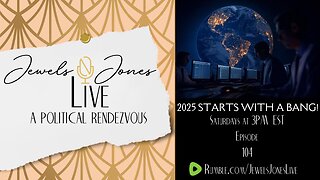 2:06:43
2:06:43
Jewels Jones Live ®
1 day ago2025 STARTS WITH A BANG! | A Political Rendezvous - Ep. 104
118K41 -
 4:20:41
4:20:41
Viss
17 hours ago🔴LIVE - PUBG Duo Dominance Viss w/ Spartakus
93K12 -
 10:15:14
10:15:14
MDGgamin
20 hours ago🔴LIVE-Escape From Tarkov - 1st Saturday of 2025!!!! - #RumbleTakeover
74K2 -
 3:54:19
3:54:19
SpartakusLIVE
16 hours agoPUBG Duos w/ Viss || Tactical Strategy & HARDCORE Gameplay
83.4K1 -
 5:54:54
5:54:54
FRENCHY4185
17 hours agoFRENCHY'S BIRTHDAY BASH !!! THE BIG 40 !!!
91.3K3 -
 1:23:33
1:23:33
Michael Franzese
1 day agoThings to look forward to in 2025
109K64 -
 3:23:02
3:23:02
I_Came_With_Fire_Podcast
1 day agoDefeating VICTIMHOOD: Advocacy, Resiliency, and Overcoming Abuse
111K20 -
 2:00:56
2:00:56
Game On!
1 day ago $10.63 earnedNFL Experts debate if Joe Burrow will make HISTORY in Week 18!
121K16 -
 2:07:57
2:07:57
InfiniteWaters(DivingDeep)
4 days agoHOW TO ENTER 2025 LIKE A BOSS!
47.7K1



